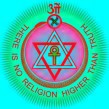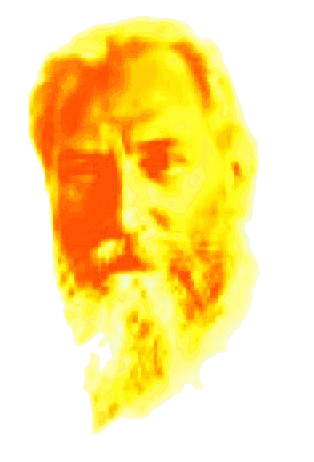The Writings of C
What Theosophy Is
From
A Textbook of Theosophy
By
C
“ There is a school of philosophy still in
existence of which modernculture has lost sight.” In
these words Mr. A. P. Sinnett began his1881 book, The Occult World, the first
popular exposition of Theosophy, published thirty years ago. During the years
that have passed since then, many thousands have
learned wisdom in that
school, yet to the majority its teachings are still unknown, and they can give
only the vaguest of replies to the query, “What is Theosophy?”
Two books already exist
which answer that question: Mr. Sinnett’s Esoteric
Buddhism and Mrs. Besant’s The Ancient Wisdom. I have no thought of entering
into competition with those standard works; what I desire is to present a
statement, as clear and simple as I can make it, which may be regarded as
introductory to them.
We often speak of
Theosophy as not in itself a religion, but the truth which lies behind all
religions alike. That is so; yet, from another point of view, we may surely say
that it is at once a philosophy, because it puts plainly before us an
explanation of the scheme of evolution of both the souls and the bodies
contained, in our solar system. It is a religion in so far as, having
shown us the course of
ordinary evolution, it also puts before us and advises a method of shortening
that course, so that by conscious effort we may progress more directly towards
the goal.
It is a science, because
it treats both these subjects as matters not of theological belief but of
direct knowledge obtainable
by study and
investigation. It asserts that man has no need to trust to blind faith, because
he has within him latent powers which, when aroused, enable him to see and
examine for himself, and it proceeds to prove its case by showing how those
powers may be awakened. It is itself a result of the awakening of such powers
by men, for the teachings which it puts before us are founded upon direct
observations made in the past, and rendered possible only by such development.
As a philosophy, it
explains to us that the solar system is a carefully - ordered mechanism, a
manifestation of a magnificent life, of which man is but a small part.
Nevertheless, it takes up that small part which immediately concerns us, and
treats it exhaustively under three heads – present, past and future.
It deals with the
present by describing what man really is, as seen by means of developed
faculties. It is customary to speak of man as having a soul.
Theosophy, as the result
of direct investigation, reverses that dictum, and states that man is a soul,
and has a body – in fact several bodies, which are his vehicles and instruments
in various worlds. These worlds are not separate in space; they are
simultaneously present with us, here and now, and can be examined; they are the
divisions of the material side of Nature –
different degrees of
density in the aggregation of matter, as will presently be explained in detail.
Man has an existence in several of these, but is normally conscious only of the
lowest, though sometimes in dreams and trances he has glimpses of some of the
others. What is called death is the laying aside of the vehicle belonging to
this lowest world, but the soul or real man in a higher world is no more
changed or affected by this than the physical man is changed or affected when
he removes his overcoat. All this is a matter, not of speculation, but of
observation and experiment.
Theosophy has much to
tell us of the past history of man – of how in the course of evolution he has
come to what he now is. This also is a matter of observation, because of the
fact that there exists an indelible record of all that has taken place – a sort
of memory of Nature – by examining which the scenes of earlier evolution may be
made to pass before the eyes of the
investigator as though
they were happening at this moment. By thus studying the past we learn that man
is divine in origin and that he has a long evolution behind him – a double
evolution, that of the life or soul within, and that of the outer form. We
learn, too, that the life of man as a soul is of what to us
seems enormous length,
and that what we have been in the habit of calling his life is in reality only
one day of his real existence.
He has already lived
through many such days, and has many more of them yet before him; and if we
wish to understand the real life and its object, we must consider it in
relation not only to this one day of it, which begins with birth and ends with
death, but also to the
days which have gone before and those which are yet to come.
Of those that are yet to
come there is also much to be said, and on this subject too a great deal of
definite information is available. Such information is obtainable, first, from
men who have already passed much further along the road of evolution than we,
and have consequently direct experience of it; and,
secondly, from
inferences drawn from the obvious direction of the steps which we seem to have
been previously taken. The goal of this particular cycle, is in sight, though
still far above us but it would seem that, even when that has been attained, an
infinity of progress still lies before everyone who is willing to undertake it.
One of the most striking
advantages of Theosophy is that the light which it brings to us at once solves
many of our problems, clears away many difficulties, accounts for the apparent
injustices of life, and in all directions brings order out of seeming chaos.
Thus while some of its teaching is based upon the observation of forces whose
direct working is somewhat beyond the ken of the ordinary man of the world, if
the latter will accept it as a hypothesis he will very soon come to see that it
must be a correct one, because it, and it alone, furnishes a coherent and
reasonable explanation of the drama of life which is being played before him.
The existence of
Perfected Men, and the possibility of coming into touch with Them and being
taught by Them, are prominent among the
great new truths which Theosophy brings to the Western World. Another of them
is the stupendous fact that the world is not drifting blindly into anarchy, but
that its progress is under the control of a perfectly organized Hierarchy, so
that
final failure even for
the tiniest of its units is of all
impossibilities the most
impossible. A glimpse of the working of that Hierarchy inevitably engenders the
desire to co-operate with it, to serve under it, in however humble a capacity,
and some time in the far-distant future to be worthy to join the outer
fringes of its ranks.
This brings us to that
aspect of Theosophy which we have called religious. Those who come to know and
to understand these things are dissatisfied with the slow aeons
of evolution; they yearn to become more immediately useful, and so they demand
and obtain knowledge of the shorter but steeper Path. There is no possibility
of escaping the amount of work that has to be done. It is like carrying a load
up a mountain; whether one carries it straight up a steep path or more
gradually by a road of gentle slope, precisely the same number of foot-pounds
must be exerted. Therefore to do the same work in a small fraction
of the time means
determined effort. It can be done, however, for it has been done; and those who
have done it agree that it far more than repays the trouble.
The limitations of the
various vehicles are thereby gradually transcended, and the liberated man
becomes an intelligent co-worker in the mighty plan for the evolution of all
beings.
In its capacity as a
religion, too, Theosophy gives (Page 6) its followers a rule of life, based not
on alleged commands delivered at some remote period of the past, but on plain
common sense as indicated by observed facts. The attitude of the student of
Theosophy towards the rules which it prescribes resembles rather that which we
adopt to hygienic regulations than obedience to religious commandments. We may
say, if we wish, that this thing or that is in accordance with the divine Will,
for the divine Will is expressed in what we know as the laws of nature. Because
that Will wisely ordereth all things, to infringe its
laws means to disturb the smooth working of the scheme, to hold back for a
moment that fragment or tiny part of evolution, and consequently to bring
discomfort upon ourselves and others. It is for that reason that the wise man
avoids infringing them – not to escape the imaginary wrath of some offended
deity.
But if from a certain
point of view we may think of Theosophy as a religion, we must note two great
points of difference between it and what is ordinarily called religion in the
West. First, it neither demands belief from its followers, nor does it even
speak of belief in the sense in which that word is usually employed. The
student of occult science either knows a thing or suspends his judgment about
it; there is no place in his scheme for blind faith.
Naturally, beginners in
the study cannot yet know for
themselves, so they are
asked to read the results of the various observations and to deal with them as
probable hypothesis – provisionally to accept and act upon them, until such
time
as they can prove for
themselves.
Secondly, Theosophy
never endeavours to convert any man from whatever
religion he already holds. On the contrary, it explains his religion to him,
and enables him to see in it deeper meanings than he has ever known before. It
teaches him to understand it and live it better than he did, and in many cases
it gives back to him, on a higher and more intelligent level, the faith in it
which he had previously all but lost.
Theosophy has its aspect
as a science also; it is in very truth a science of life, a science of the
soul. It applies to everything the scientific method of oft-repeated,
painstaking observation, and then tabulates the results and makes deductions
from them. In this way it has investigated the various planes of nature, the
conditions of man’s consciousness during life and after what is
commonly called death.
It cannot be too often repeated that its statements on all these matters are
not vague guesses or tenets of faith, but are based upon direct and
oft-repeated observation of what happens. Its investigators have dealt also to
a certain extent with subjects more in the range of ordinary science, as may be
seen by those who read the recently issued book on Occult
Chemistry.
Thus we see that
Theosophy combines within itself some of the characteristics of philosophy,
religion and science. What, it
might be asked, is its
gospel for this weary world? What are the main points which emerge from its
investigations?
What are the great facts
which it has to lay before humanity?
They have been well
summed up under three main heads.
“There are three truths
which are absolute, and which cannot be lost, but yet may remain silent for
lack of speech.
“The soul of man is
immortal, and its future is the future of a thing whose growth and splendour has no limit.
“The principle which
gives life dwells in us and without us, is undying and eternally beneficent, is
not heard or seen or smelt, but is perceived by the man who desires perception
“Each man is his own
absolute lawgiver; the dispenser of glory or gloom to himself; the decreer of his life, his reward, his punishment.
“These truths, which are
as great as is life itself, are as simple as the simplest mind of man”.
Put shortly, and in the
language of the man of the street, this means that God is good, that man is
immortal, and that as we sow so we must reap. There is a definite scheme of
things; it is under intelligent direction and works under immutable laws. Man
has his place in this scheme and is living under these laws.
If he understands
them and co-operates with them, he will
advance rapidly and will be happy; if he does not understand them – if
wittingly or unwittingly, he breaks them, he will delay his progress and be
miserable. These are not theories, but proved facts. Let him who doubts read
on, and he will see.
For more info on Theosophy
Try these
Cardiff Theosophical Society meetings
are informal
and there’s always a cup of tea afterwards
The Cardiff Theosophical
Society Website
The National Wales Theosophy Wesbsite
Dave’s Streetwise Theosophy
Boards
If
you run a Theosophy Group then please
Feel
free to use any material on this Website
Theosophy
Cardiff’s Instant Guide to Theosophy
One
Liners & Quick Explanations
The main criteria for the
inclusion of
links on this site is that they are
have some
relationship (however tenuous) to
Theosophy
and are lightweight, amusing or
entertaining.
Topics include Quantum Theory
and Socks,
Dick Dastardly and Legendary Blues Singers.
No
Aardvarks were harmed in the
History
of the Theosophical Society
General pages about Wales,
Welsh History
and The History of Theosophy in
Wales
Her Teachers Morya & Koot Hoomi
The
Most Basic Theosophy Website in the Universe
If you run a Theosophy Group
you can use
this as an introductory handout
Lentil burgers, a thousand
press ups before breakfast and
the daily 25 mile run may put it
off for a while but death
seems to get most of us in the end.
We are pleased to
present for your consideration, a
definitive work on the
subject by a Student of Katherine Tingley entitled
Theosophy and the Number Seven
A selection of articles
relating to the esoteric
significance of the Number 7
in Theosophy
The Spiritual Home of Urban Theosophy
The Earth Base for Evolutionary Theosophy
The Birmingham Annie Besant Lodge
_____________________
Camberley, Surrey, England GU15 - 2LF
Tekels Park to be Sold to a Developer
Concerns are raised about the fate of the wildlife as
The Spiritual Retreat, Tekels Park in Camberley,
Surrey, England is to be sold to a developer
Tekels Park is a 50 acre woodland park, purchased
for the Adyar Theosophical Society in England in 1929.
In addition to concern about the park, many are
worried about the future of the Tekels Park Deer
as they are not a protected species.
Many feel that the sale of a
sanctuary
for wildlife to a
developer can
only mean
disaster for the park’s animals
Confusion as the Theoversity
moves out of
Tekels Park to Southampton, Glastonbury &
Chorley in Lancashire while the leadership claim
that the Theosophical
Society will carry on using
Tekels Park despite its sale to a developer
Future of Tekels Park Badgers in Doubt
Tekels Park & the Loch
Ness Monster
A Satirical view
of the sale of Tekels Park
in Camberley,
Surrey to a developer
The Toff’s
Guide to the Sale of Tekels Park
What the men in
top hats have to
say about the sale
of Tekels Park
____________________
Theosophy Cardiff
Nirvana Pages
Glastonbury
Pages
The Theosophy
Cardiff Guide to
The Theosophy Cardiff
Guide to
The
Theosophy Cardiff Guide to
The Terraced Maze of Glastonbury Tor
Glastonbury and Joseph of Arimathea
The
Grave of King Arthur & Guinevere
Views
of Glastonbury High Street
The
Theosophy Cardiff Guide to
__________________________
Classic Introductory Theosophy Text
A Text Book of Theosophy By C
What Theosophy Is From the Absolute to Man
The Formation of a Solar System The Evolution of Life
The Constitution of Man After Death Reincarnation
The Purpose of Life The Planetary Chains
The Result of Theosophical Study
An Outstanding
Introduction to Theosophy
By a student of
Katherine Tingley
Elementary Theosophy Who is the Man? Body and Soul
Body, Soul and Spirit Reincarnation Karma
Try these if you are
looking for a
local
Theosophy Group or Centre
UK Listing of
Theosophical Groups
Worldwide
Directory of Theosophical Links
General pages about Wales,
Welsh History
and The History of Theosophy in
Wales
Wales is a
Principality within the United Kingdom
and has an eastern
border with England.
The land area is
just over 8,000 square miles.
Snowdon in North Wales is the highest mountain at 3,650 feet.
The coastline is
almost 750 miles long.
The population of Wales as at the 2001 census is 2,946,200.



